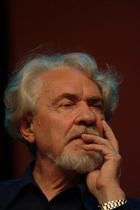
He was born in 1939 in Siberia, spent his childhood in a Tatar village and moved to Moscow to study journalism. After a few years working in the polar station an island at the edge of the planet, where he participated in five expeditions to the Arctic, developed for many years an important role as editor of radio and television in various Soviet media. He has collaborated in the production of several documentaries among them Confidential life of the Soviet Union in 1990, KGB and publicity in 1992 and The Manuscripts do not burn in 1997.In 1988, at the height perestroika, when the country was struggling to open up to democracy, Shentalinski pressured the Organization of Writers, public opinion and the bigwigs of the party to form a commission that would bring to light the truth about the uncertain fate of the Russian intelligentsia repressed, whose story was hidden in the archives of the Lubyanka. And was the first to open the literary archives of the KGB and resurrect valuable manuscripts and related to the life of notable Russian writers as Mandelshtam, Berdyaev, Platonov, Tsvetaeva, Akhmatova or Pasternak documents. The achievements of their research they are listed in the trilogy published by Galaxia Gutenberg composed titles: Slaves of Freedom (2005), Complaint against Socrates (2006) and Crime without punishment (2007). Vitali Shentalinski is also the author of several books of poetry and essays translated into various languages, as well as responsible along with Russian literature professor Ricardo San Vicente in the collection "The tragedy of culture ', which meets six volumes of classics Russian literature of the twentieth century, published under this label









